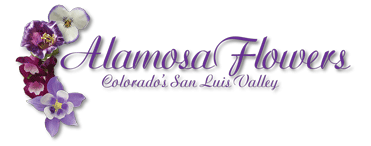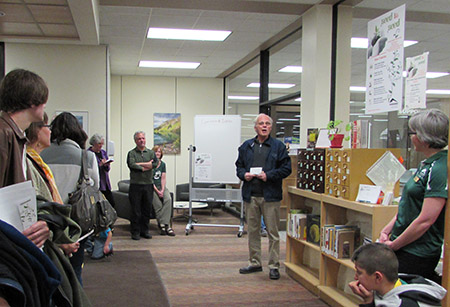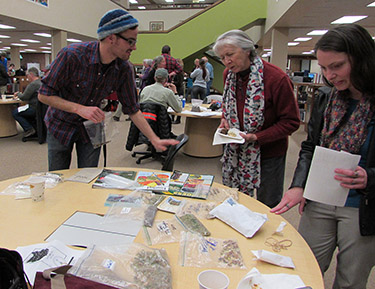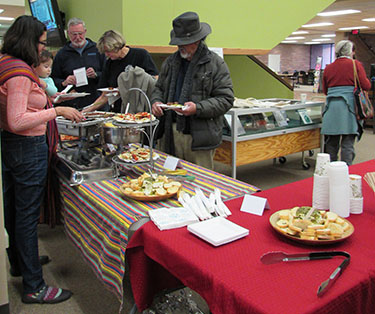By Marilyn Loser
2015 February 27
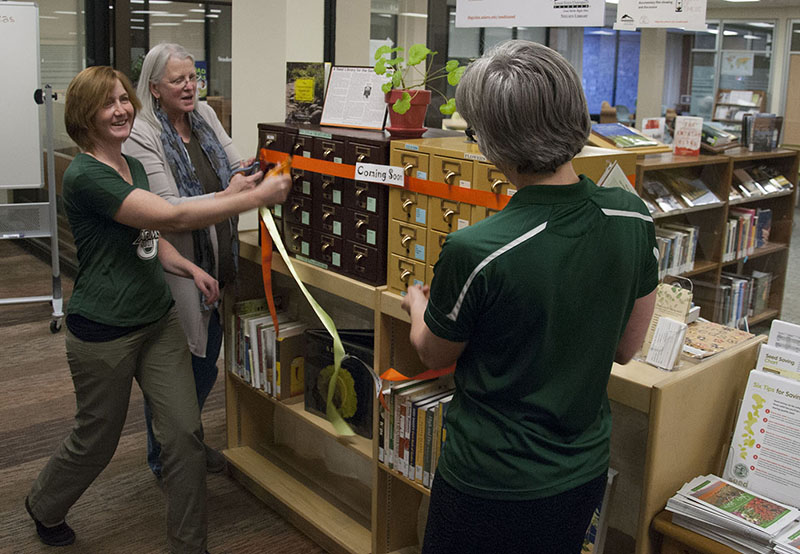
Carol Smith, ASU Library Director; Mary Walsh, ASU Cataloging & Acquisitions Librarian; and Karen Lemke, ASU College Readiness Programs Director, cut the ribbon on the new seed library catalog. Photo courtesy of Daniel Parsons
More than 50 people attended the lively kickoff event for the San Luis Valley (SLV) Seed Library housed in Adams State University’s Nielsen Library. Library Director Carol Smith began the festivities by asking, “Who has control over our food supply?” She explained that having seeds in a library, seeds that are available to everybody, in the community gives us some control. There are about 300 seed libraries across the country.
Surprised at having seeds in a library? The vision of the library is to become the campus and community destination for inspiration, discovery, and creation. Smith said libraries are undergoing a transformation -- they’ve gone beyond books. “The mission is to learn, create, and share,” she said. The seed library will share seeds as well as some equipment such as screens for separating seeds from other plant material.
Currently, the seed catalog contains more than 100 varieties of seeds stored in packets and sorted alphabetically under 3 categories: fruit and vegetables, herbs, and flowers. The goal is to have local seeds. However, to kick start the library, the catalog contains local seeds as well as purchased seeds.
SLV citizens can check out seed packets for 365 days. There is no penalty if you can’t return any seeds. However, you do need an ASU Library card which is available to valley residents. View the seed offerings online by visiting the Seed to Seed webpage at http://libguides.adams.edu/seedtoseed. You can browse and see what seeds are on the shelf!
Paul Niebel, Kirby House Argo, LLC, explains the importance of seed banks in preserving seed diversity around the world. Photo courtesy of Stacy Taylor. |
Following the ribbon cutting, Paul Niebel of Kirby House Argo, LLC, talked about the importance of seed diversity. He said, “The best method to preserve seed diversity is to continue to grow and harvest seed.” As an example of the loss of diversity, Niebel described the French government’s attempt to guarantee seed varietal identity and purity. The French government requires all commercial seed to be certified. Since it costs 200 euros to certify each seed type, commercial enterprises only certify profitable seed. The downside is that seed diversity in France has decreased by 90%. Following the opening ceremony, people climbed the stairs to share seeds and to feast on mostly local foods from the bountiful buffet. With students, children, and adults milling around eating, discussing and exchanging seeds, and playing with large fitness balls, it was not the hushed, restrictive atmosphere associated with libraries of the past. Karen Lemke, ASU College Readiness Programs Director, had to yell to introduce the film, “Seeds of Time.” “I can’t believe I yelled in the library!" exclaimed Lemke. |
Several tables on the second floor of the library were spread with seeds people brought to share with interested gardeners. Photo courtesy of Stacy Taylor. |
A delicious buffet of mostly local foods inspired and fed the more than 50 kickoff participants. Photo courtesy of Stacy Taylor. |
All was quiet once the film began. “Seeds of Time” follows agriculture pioneer Cary Fowler’s global journey to save the eroding foundation of our food supply in a new era of climate change.
Want to learn more about gardening, seed saving and other seed-related topics? Visit the Seed to Seed webpage for valley-wide events.
The seed library is a joint initiative of Nielsen Library, SLV Local Foods Coalition, Valley Educational Garden Initiative, and the Alamosa Community Greenhouse.
